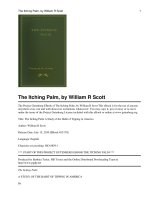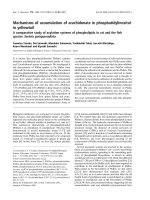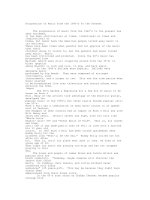progression of music in america since the 1940s
Bạn đang xem bản rút gọn của tài liệu. Xem và tải ngay bản đầy đủ của tài liệu tại đây (32.84 KB, 2 trang )
The progression of music from the 1940's to the present has seen
extremes, it has been controversial at times, traditional at times and
inspirational at times, but never have the American people turned away
music in its entirety. There have been times when parents did not
approve of the music that their children chose to listen to, but the parents
had never turned away music. Music has been criticized and promoted.
Since the 40's music has progressed from Ballads (which were still
lingering around from the 30's) to blues (popular among Blacks) to rock
and roll, to pop, and back again. In the 1940's ballads were popular.
Ballads were dancable music performed by big bands. They were
composed of stringed instruments, wind insteruments, and a singer or
two. This was the time period when music started to be broadcasted live
over television and record albums were entering the home. (Hays) The
50's marked a beginning for a new era of music to be known as Rock &
Roll. Many of the artists took advantage of the Electric guitar, developed
for popular music in the 1930's but never really became popular until the
50's. Rock & Roll was a combination of many music styles in an upbeat
sort of fashion. One example of when country had an impact on Rock &
Roll was with Bill Haley and Jerry Lee Lewis. Jerry's career was huge,
with his hits like "Whole Lotta Shakin' goin' On" and "Great Balls of Fire".
That is, his career was huge, until the it was made public that he fell in
love with a married his 13 year old cousin. In 1957 Rock & Roll had been
turned upsidedown when Buddy Holly hit the airwaves with "That'll be the
Day." Buddy Holly rolled out hit after hit after hit. That is, until his plane
went down in Iowa. He died at the young age of 22. That night his music
was playing non-stop and has not stopped playing to this day.
The blues and gospel of James Brown and Jackie Wilson was
popular with the black community. "Someday, maybe someone will
discover the reason that Chuck Berry, Do Diddley, Fats Domino, and
Little Richard never connected with black audiences" (25 years,p15).
This may be because they might have almost been embarrassed from
their blues roots. In the 60's such stars as Chubby Checker became
popular through Dick Clark. Chubby Checker also became popular
though his dance called "The Twist". Folk music was among popular
music for a brief period time. Around 1962 Surfin music started in
California when the Beach Boys were formed. The Beach Boys released
hit after hit starting with "Surfin USA" in 1963 and "Fun, Fun, Fun" in
1964. Along with The Beach Boys were a group of two known as Jan &
Dean. They also produced Surfin Music hits such as "Sidewalk Surfin'"
and Dead Man's Curve. The sixties also introduced the British Invasion
to America. Groups like "The Yardbirds" and Zombies could be heard
everywhere. At the head of this British invasion was a group known as
"The Beatles" There hits like "I want to hold your hand". They broke up in
1970 and all pursued solo careers or in their own band. Many people
requested that they have reunions, but those requests basically stopped
with the death of John Lennon, a member of the Beatles, was murdered
in 1980. "The Rolling Stones" were formed in 1962 and very much
contrasted the Beatles softer sound. The Rolling Stones were a more
energetic type of American rhythm and Blues. In the 70's The electric
guitar became more experimental with the different sounds that it could
produce. "The change began in 1968. By 1970 the change in direction
of rock music was cemented. No longer were life-or-death rock riffs the
order of the day. Groups like Crosby, Stills and Nash, The Band, and
Creedence Clearwater Revival suggested a return to country roots, a
search for a simpler time." (25 years,p60) Disco returned in 1974.
Everything went wild when " Saturday night Fever" introduced a new type
of dancing and music. The new form of disco hit the floors with "The Bee
Gees" They kept the anger of original Rytheme and Blues and created
very upbeat material. Very popular among disco was Gloria Gaynor.
She sang the message of the new movement:I won't crumble,I won't lay
down and die,I will survive.During this disco period Rock & Roll is some
how still staying alive. When the mid 70's rolled around disco
fell behind and new type of rock became popular. This new type included
artist such as Alice Cooper and AeroSmith. The new rock had a punkish
industrial twist to it and always put on large extravagant concerts. In the
80's the synthesizer became big with such groups as "The Eurythmics".
The new groups of the 80's revolutionized disco and transformed it to
todays techno. Synthesizers are insteruments usually in a piano format
that can manipulate sounds into any desired fashion. The 80's also
brought around many teen idols such as Bon Jovi, Madonna, and Paula
Abdul. In the 90's or present day, the synthesizer is still being used in
dance and techno music. Also introduced into the 90's was the
computer. The computer has been around a while, but not been used in
the music industry. Today just about anyone can produce their music
using this tool. Also metal has become more aggressive, popular and
contains political lyrics. Lite rock has also developed and has captured
the ears of many listeners. Music has progressed from fun to an
industry in itself. People can now earn a living off of music, often
luxurious life. Along with the music progressing the American people
have progressed. The world of music continues to change and may
never stop progressing until the world stops progressing.Footnotes 25
Years of Rock & Roll (USA:Lorelei Publishing Co. Inc.,1979) William Hay,
Twentieth-Century Views of Music History (USA:Berne
Convention.,1972)Bibliography 25 Years of Rock & Roll. USA:Lorelei
Publishing Co. Inc.,1979 Ewen, David. American Popular Songs. New
York:Random House, 1966 Hay, William. Twentieth-Century Views
of Music History. USA:Berne Convention, 1972 Wilder, Alec. American
Popular Song New York:Oxford University Press, 1972









